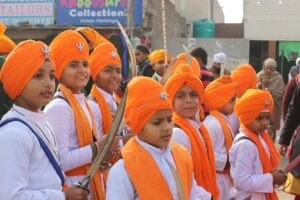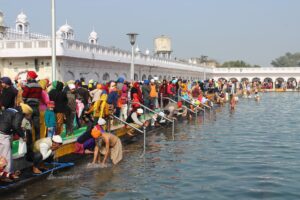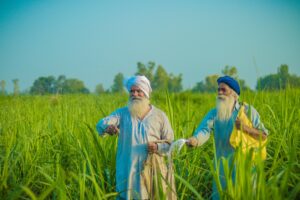Baisakhi 2023
Baisakhi is an auspicious Indian festival mainly celebrated in Punjab. In 2023 Baisakhi falls on 14 April. Baisakhi 2023 will start at 3:12 PM hours on 14 April after the Mesha Sankranti. According to the Sikh calendar, Vashakhi comes on the 1st Day of Basakhi month and is celebrated on annual basis. It is also believed that this is the start of the Punjabi new year. Moreover, basakhi is also connected with Crop harvesting.

History Of the Baisakhi Festival | Why Vasakhi Celebrated?
Baisakhi, also known as Vaisakhi, is an annual festival celebrated by the Sikh community worldwide. It is an important celebration in the Sikh calendar, with both religious and cultural significance.
Baisakhi has its roots in the year 1699, when Guru Gobind Singh, the tenth Sikh Guru, founded the Khalsa Panth, a community of committed and dedicated Sikhs who would live by the principles of Sikhism. On the day of Baisakhi in 1699, Guru Gobind Singh called upon his followers to gather in the city of Anandpur Sahib. He gave a powerful speech and baptized his first five disciples, who became the Panj Pyare or the Five Beloved Ones.
This event was a turning point in Sikh history, as Guru Gobind Singh gave the Sikh community a new identity and direction. He instilled in his followers the values of courage, sacrifice, and devotion, and called upon them to stand up against oppression and tyranny.
Rituals Related to the Vashakhi
Baisakhi is celebrated every year by the Sikh community as a day of renewal and rebirth. The festival is marked by the singing of hymns, the reading of the Guru Granth Sahib, the Sikh holy book, and the sharing of food and sweets. Sikhs also participate in processions, known as Nagar Kirtans, in which they carry the Sikh flag, or Nishan Sahib, and sing devotional songs.

Harvesting Festivals of Crops| Baisakhi 2023
Apart from its religious significance, Baisakhi is also an important agricultural festival, marking the beginning of the harvest season in the Punjab region of India. Farmers thank God for the bounty of the harvest and pray for a good crop in the coming year.
In conclusion, Baisakhi is a celebration of the Sikh faith, its history, and traditions, and the values of community, courage, and compassion. It is a time for Sikhs to come together, reaffirm their commitment to their faith, and celebrate the blessings of life.

How Do People Celebrate Vashakhi ?
Baisakhi 2023 celebrations usually begin with a procession called Nagar Kirtan, where people gather and sing hymns from the Sikh holy book, the Guru Granth Sahib. This procession is led by the Sikh holy book, which is carried on a decorated float called Palki Shahib.
Baisakhi 2023 festivities also include traditional Punjabi folk music and dance, such as Bhangra and Gidda, which are performed in colorful costumes. People also enjoy traditional Punjabi food and sweets, such as Sarson Ka Saag, and Makki Ki Roti, and Jalebi.
Where Vashakhi Celebrated the Most?
Because vashakhi is related to sikh panth and sikh community mainly resides in Punjab, so punjab is the main state of india where vashakhi celebrated with great enthusiasm and celebrations. Moreover in Lahore, Pakistan (as during the Partition half of the Punjab region falls in Pakistan) vashakhi also celebrated with the same spirit.
The in other part of the country also celebrates with great devotion any joy.
Frequently Asked Questions (FAQ’S)
When was Vaisakhi first celebrated?
In 1699 Guru Govind Singh Ji founded the khalsa Pant , a military of Sikh warriors. This event is known as the Khalsa Sirjana Divas or the Birth of the Khalsa. From that day vashkhi celebration starts as the day of origin for Sikh pant.
Why do farmers celebrate Baisakhi?
Farmers in the Punjab region of South Asia, which is now divided between India and Pakistan, celebrate Baisakhi as a harvest festival. This festival is traditionally celebrated in April when the winter crops are ready to be harvested and the new crop is ready to be sown.
Is Baisakhi a holiday in India?
Yes, Baisakhi is a public holiday in India, especially in the northern states of Punjab, Haryana, and Delhi, where a large number of Sikh communities reside. It is also observed as a holiday in other parts of India, including Himachal Pradesh, Uttarakhand, and Jammu & Kashmir.
Why is Baisakhi on 14th April?
Baisakhi is celebrated on April 13th or 14th every year, depending on the Nanakshahi calendar, which is a solar-based calendar introduced by the Shiromani Gurdwara Parbandhak Committee in 2003 to replace the traditional lunar-based Bikrami calendar.
The Nanakshahi calendar is based on the tropical year, which is the time it takes for the Earth to complete one orbit around the Sun. It divides the year into 12 months, each consisting of 30 or 31 days, and adds an extra month in leap years to keep the calendar in sync with the solar cycle.
According to the Nanakshahi calendar, Baisakhi falls on the first day of the month of Vaisakh, which usually coincides with April 13th or 14th in the Gregorian calendar.
What is the significance of April 14 in India?
April 14 is celebrated as the Vasakhi festival in India mainly in the Punjab region of north India.
what happened on baisakhi 1919?
On April 13, 1919, a large crowd of Punjabi civilians, mostly Sikhs, had gathered in the Jallianwala Bagh, a public garden, to celebrate the festival of Baisakhi and protest against the recent British colonial government’s repressive policies. General Reginald Dyer, a British army officer, arrived with a group of soldiers and without any warning, ordered them to fire on the unarmed crowd. The soldiers opened fire, killing and injuring hundreds of people, many of whom were women and children.
The Jallianwala Bagh Massacre, as it came to be known, was a turning point in India’s struggle for independence from British colonial rule. The event sparked outrage across India and led to widespread protests and boycotts of British goods. It also marked the beginning of the Non-cooperation Movement, a campaign of civil disobedience led by Mahatma Gandhi and other Indian nationalist leaders, aimed at securing India’s independence.
The Jallianwala Bagh Massacre is considered one of the darkest chapters in India’s history, and the memory of the event is still deeply felt by many people, particularly in the state of Punjab, where the city of Amritsar is located.
Thanks For Reading this article, Leave your comments below for any queries. You can also find other related articles in this website. Happy Vashakhi .


